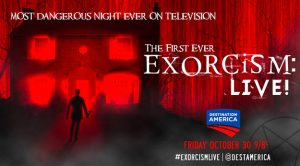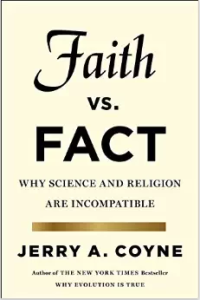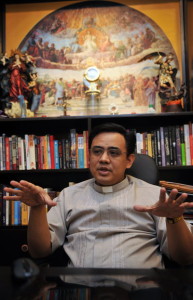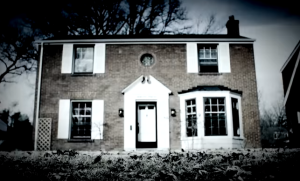 I wrote about the increased demand for exorcisms since the election of Jorge Mario Bergoglio to the papacy back in June – what many are calling the “Pope Francis Effect”.
I wrote about the increased demand for exorcisms since the election of Jorge Mario Bergoglio to the papacy back in June – what many are calling the “Pope Francis Effect”.
In June 2014, Pope Francis formally recognized the statutes of the International Association of Exorcists (IAE). This recognition gave them a validity they hadn’t had before and has led to a huge demand in the requests for exorcisms. Pope Francis approves of this – he has a desire to revive what he calls the “spiritual” side of the Roman Catholic Church, and he sees this as a good way to do it. Bringing fear back to religion was always a great way to get people grovelling at the altar. It would be laughable if it wasn’t for the real damage being done, particularly to those with serious mental health illnesses.
The post I wrote in June (linked to above) was about the exorcism of Mexico, and yes, I mean the whole country. Since then, I’ve also seen a story in NPR entitled Help Wanted: The Philippines Needs More Exorcists by Simone Orendain. I’ve reproduced the full story below:
Alvin Bailon and his wife were at their wits’ end last September. Their 12-year-old son, an honors student, had begun having anxiety attacks, mostly about school. “And then all of a sudden he would slowly lose consciousness,” Bailon recalls. “We term it as doze off. He would doze off and he would fall down slowly.”
They brought him to three doctors, had his brain scanned (no irregularities were found), tried all sorts of anxiety pills prescribed by doctors. They even went to healers who use crystals for therapy.
Then they tried a beach retreat that the healers had recommended. Their son did well, but Bailon says on the car ride home the child “dozed off” and whispered in a totally unfamiliar voice, “Shhh, you might wake him up.”
That’s when the Bailons did what many in the overwhelmingly Catholic country do when facing a family crisis: They turned to the church — and its Office of Exorcism, opened in 2006 to address a growing number of cases and run by Father Jose Francisco Syquia.
Father Jose Francisco Syquia heads the Office of Exorcism in the Philippines. (Source: Ted Aljibe/AFP/Getty Images)
Dressed in a short-sleeve button-down shirt, the Rome-trained exorcist says he has been driving demonic spirits out of people and houses for more than a dozen years. He has seen a steady increase in cases in the past decade, with 200 so far this year.
“At any given time we have at the minimum 30 cases,” says the 48-year-old. “And we’re only five exorcists.”
Father Syquia leads a team of four priests who get additional assistance from volunteers: psychiatrists, doctors, lawyers and laypeople.
Given the number of cases he’s juggling, Syquia recently sent a letter to the Philippine bishops conference asking that it send one resident exorcist to each of the country’s 86 dioceses.
“[The] majority of them do not have exorcists or a team of exorcists that deal with these kinds of cases,” says Syquia. “Therefore many of the Filipinos tend to go to the occult practitioners, what we call the faith healers, spiritists, etc.”
Syquia believes these occult healers are responsible for the increased number of demonic possessions. The healers leave a person with “spiritual openings” that allow demons to latch on, he says.
Meanwhile, it’s a draining job for the official exorcists. Just one session of prayers for a possessed individual can last four hours. And it may take several sessions, according to Syquia, to drive out evil spirits.
“That’s very tiring,” says Father Winston Cabading, secretary general of the University of Santo Tomas and a member of Syquia’s team.
Not only that, the exorcists also have to deal with the aftereffects. They believe that demons retaliate against the priests.
“You expect that there will be more, what we call, retaliations because you are jumping into enemy territory and retaking … what truly belongs to God,” says Syquia. “And therefore it’s more like maybe a commando raid behind enemy lines.”
At least one of Syquia’s trainees quit. Syquia says the trainee believed he had developed unexplained illnesses because of the work he was doing.
Nonetheless, Syquia believes young priests and seminarians have a real interest in spiritual warfare. And if they stick to it, they can help people like Alvin Bailon’s son. After 10 months and 14 prayer sessions, Bailon says the boy is almost his old self.
“We’ve seen a lot of improvement in my son’s condition, which is most important,” the father reports. “He’s back in school. He’s doing so well, he’s actually very independent.”
The Philippines is, of course, a heavily Catholic country (86% Catholic). It’s the only Asian Christian country, and so seen as a bastion of the faith there. Pope Francis visited in January – on the final day it’s estimated between six and seven million attended an outdoor mass. During his visit he spoke about the need to show compassion for the poor. However, it’s the practices taught by his church that are causing some of the biggest problems in the country.
The government of the Philippines has recognized that population growth is it’s biggest problem, and the main contributor to poverty. They are actively trying to reduce the birthrate and have several programmes running, the main ones being focused on contraception and elective sterilization. For all its nice words about helping the poor, the Church opposes these programmes. It’s likely his visit, which cost US$4.5 million in security alone, did a lot of damage to the government’s efforts.
Anyway, back to exorcism. You will have noticed the pic at the top of this post. It’s an ad for “The Most Dangerous Night Ever On Television,” “The First Ever Exorcism: Live” in suitably evocative font.
Here’s the trailer for the show:
I really don’t know what to say about this. The trouble is, I know jolly well that it this was broadcast in New Zealand, I’d watch the bloody thing, thus contributing to the ratings. At the same time, I’d be worrying about all the people who will take it seriously, and whether that number will increase because of this show, or at least the way it’s presented.
According to Lee Spiegel of the Huffington Post:
Destination America’s “Ghost Asylum” team will descend on that hellhole of a home on Oct. 30 for TV’s first live exorcism, to cleanse the home of whatever it is that inspired William Peter Blatty’s 1971 best-selling novel and 1973 Academy Award-winning movie.
And to add to the “excitement”:
Joining the “Ghost Asylum” team in the camera-filled St. Louis house, is Bishop James Long, the presiding archbishop of the United States Old Catholic Church, who has performed 27 documented Solemn Rite of Exorcisms on individuals claiming possession by demonic forces.
Also on hand to de-demonize the house is paranormal investigator Chip Coffey, who believes his psychic abilities will allow him to directly connect with the house and those entities that may dwell within it.
“I’ve learned that demons’ whole reason for existing is that they want to bring down human beings — they want to destroy us, to unravel us,” Coffey told HuffPost. “I know — as a psychic and a medium — if you set out a dysfunction buffet for negative energies, they’re going to come and eat.
“This is the biggest thing I’ve ever worked on in this kind of genre, and even for me, I’ve stopped and asked myself, ‘What the hell are you doing here?’ This is really some serious, serious stuff.”
FFS! Lee Spiegel concludes:
If there are demons in this house, and if the team shows up with a variety of prayers, holy water and whatever other tools are used to rid a home of such annoyances, it will be interesting to see if the so-called demons have their own agenda and won’t leave without a fight.
I really hope he was writing that final paragraph ironically. Surely no serious journalist actually believes this stuff? The thing is, I’ve seen multiple seemingly serious websites where those of us who dismiss the idea that evil spirits exist are either pitied or mocked.
 As Jerry Coyne said about exorcism in Faith vs Fact (page 238):
As Jerry Coyne said about exorcism in Faith vs Fact (page 238):
“… who knows how many disturbed people have been subjected to a frightening procedure that is harmless at best, but potentially dangerous, especially when those who use it misconstrue and thus ignore the real causes of mental illness?”
Real people are being harmed by exorcism. Exorcists prey on the vulnerable. It is another case where religion is doing real harm to society.
Anyway, perhaps US readers could watch this for us on Friday night and report back on just how ridiculous the whole thing was. I’d like to think the show will expose exorcism for the placebo it is at best, and the exorcists, including Bishop Long, as the charlatans they are. I don’t hold much hope.



So happy to know this isn’t being shown here!
Exorcism is a primitive superstition that is hardly confined to Catholicism. We rationalists usually assail religion on two fronts: truth and consequences. We look at religious beliefs to see if they are factual, ie in accordance to the evidence. Thus we reject gods, virgin births, resurrection, chosen people, heaven, hell, because there is no evidence for them. This is the easy part.
Still, we are left with the question of whether the influence of religion on people’s lives are on balance positive or negative. False beliefs can still bring comfort to people, via the placebo effect. This may sometimes be the case with exorcisms. Religion reinforces the cohesion of the in-group, but often directs discriminations and violence on the out-group. This is a complicated assessment and many traditional atheists have declined to enter into this judgment. The New Atheists have been much more convinced that the net effect of religion on society is negative, and thus much more assertive in combating both the truth and the consequences of religion.
But beneath the specific doctrines of any religion is a core sense, which seems to be universal, that there are unseen forces influencing our lives. This is not entirely irrational, since science has disclosed many such forces, as gravity, genes, natural selection, social norms, chemical reactions which are unseen and do control our lives. We may discredit beliefs in omnipotent deities, life after death, jinns and angels. We may discredit religious practices such as circumcision, forbidden foods, sexual taboos. But we humans are not primarily rational beings. We have a thin veneer of rationality barely, and sometimes not even, masking an irrational core composed of primitive instincts and emotions. The hope that the spread of rational enlightenment is going to transform human nature by eliminating or subduing this superstitious core is very likely a chimera.
In New Zealand we’ve had some very serious cases where exorcism caused death. I haven’t mentioned any of them because all were before I started this website and none were related to Catholicism, and so far I’ve only written about exorcism in relation to Catholicism. The cases here did at least create some awareness around the subject, and hopefully thus reduced the likelihood of it happening again.
I think our species of ape is always looking for answers. Our extreme curiosity is what sets us apart. Gods were a satisfactory explanation when we didn’t have the tools to explain things. It’s no accident that the more educated a person is (not the more intelligent), especially in science, the more likely they are to be an atheist. Even among scientists, the more elite the scientist, the more likely they are to be an an atheist. Education is the key imo. We’re not rational about many things, but we can be taught to be rational. The value of any university education is the critical thinking skills obtained. My history degree, with its focus on Medieval Europe, isn’t really much use for anything, but obtaining it was invaluable because of the way it taught me to think.
Actually, reason and learning can only enhance one’s love of wisdom, and hence of God.
I don’t consider “wisdom” and “God” to be synonyms. Neil de Grasse Tyson said something like this: if all human knowledge was suddenly gone, science knowledge would come back exactly the way it is now, but no spiritual “knowledge” would. I agree with him. There’s nothing about that type of knowledge that can be relied upon or is certain. While no one can say with certainty that there’s no such thing as God, I personally consider it so extremely unlikely, I’m happy to label myself an atheist. If there is a God and he’s as good as all the good theists say he is, I’m sure He’d understand. After all, he made me this way. I don’t want to be associated in any way with the nasty God of bad theists, and even if he’s proven to exist, I won’t be worshiping him.
I do think it should be noted that it’s nasty people who think God wants them to go around being bigoted or worse, and nice people whose God is one of love.
Wisdom isn’t some deity misnamed ‘god’ which just means “to call or invoke a deity to you.”
We know quite a bit about the world now than was known when all this came about and was “explained” in terms that would fit in Medieval or neolithic times.
Much has been learned about the brain, its functions and malfunctions, psychology also has been learned and how the patient can play into what the shaman or exorcist is doing. It means going back to prmitive times of less knowledgeable times to darker times of angels and demons etc. Where the idea of brain science, evolution, a thousand other things were not known. That would be a dark age. Even though the appurtenances of technology would persist because that mental darkness of ignorance would be of its people. Like holy warriors flying in B2s to kill possessed people in ‘demonic’ nations with nuclear weapons.
This is certainly a cultural regression being foisted upon us and played to the market where in democracies superstition is just as good as hard factual science. And science may not get the ratings. Only the powerful would benefit from this. A fine way of control.